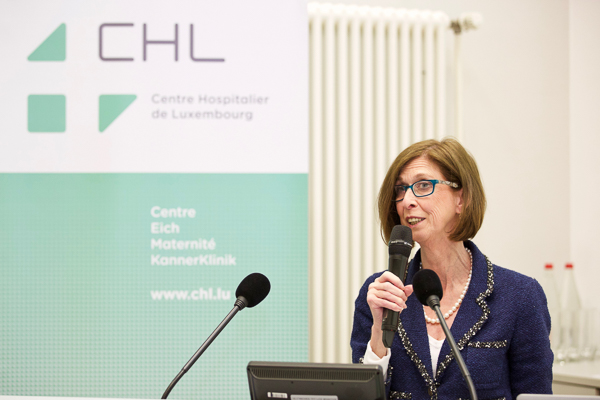
Health Minister Lydia Mutsch addressed the fourth Luxembourg Healthcare Summit yesterday, emphasising the importance of “4P medicine”, which focuses on personalised, preventive, predictive and participative care, as a reflection of Luxembourg’s priorities in healthcare.
“On the theme of participatory health, you will certainly remember that the government program is aimed at putting the patient at the heart of the health system and allowing them to exercise their role as a player in their own health. Since July 2014, this right has been anchored in the Law on Patients' Rights and Obligations. But that's not all: our last National Health Conference devoted half a day to the theme of "Health Literacy", or how to enable citizens to participate more in choices about their health”, said the minister.
She went on to highlight the national strategy that she says has resulted in significant achievements in research and clinical practice in relation to personalised medicine, and suggested that personalised medicine needs to find a framework within which to operate in health systems.
“The high level conference that we organised during the Luxembourg Presidency of the Council of the European Union was the starting point for drawing up the Council conclusions to facilitate the integration of personalised medicine into the Clinical practice based on a patient-centred approach, published in 2015”, said Minister Mutsch.
“The part of preventive medicine is very important to us, particularly in the context of WHO's global action to combat non-communicable diseases, supported by the United Nations. Noncommunicable diseases represent a major scourge of the 21st century in terms of public health and a challenge that all health systems are facing.
“In terms of predictive medicine, identifying personal risk factors and adapting prevention on an individual scale is an emerging strategy that has already proved successful in certain situations and has the potential to transform the way screening programs And prevention are carried out. Our health system must follow the achievements of science and the development of knowledge so as not to miss the opportunity to integrate prevention and treatment strategies in an optimal and lasting way to the individual needs of the persons concerned .
“The success of such integration remains dependent, however, on our ability to offer our population not only access to these new technologies, but also to use objective and comprehensible information and communication methods on the risks and benefits of 4P medicine, to train health professionals to be able to use these new technologies, and to support research, production of knowledge and exchange of good practice in 4P medicine. It is only at this price that 4P will be able to demonstrate its added value for the patient, which remains at the heart of our concerns”, concluded the minister.
Image: Lydia Mutsch, at the Centre Hospitalier de Luxembourg in May this year.








